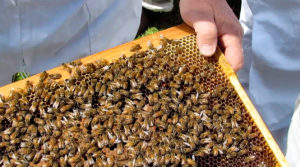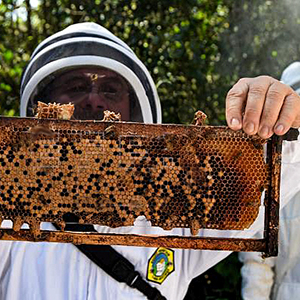Twenty-one George Mason University students traveled over spring break to learn how Mason’s Honey Bee Initiative empowers communities through sustainable beekeeping and to investigate how tri-sector partnerships (nonprofit, for-profit, government) can work together to solve complex global challenges like gender equity and food security.
 This year, for the first time, the Honey Bee Initiative brought together students from two universities and multiple disciplines in an effort to enrich the intercultural exchange of ideas between Mason and the University Industrial of Santander (UIS) students in encouraging sustainable business practices. UIS is the largest higher education institution and is regarded as one of the leading multidisciplinary research universities in Colombia.
This year, for the first time, the Honey Bee Initiative brought together students from two universities and multiple disciplines in an effort to enrich the intercultural exchange of ideas between Mason and the University Industrial of Santander (UIS) students in encouraging sustainable business practices. UIS is the largest higher education institution and is regarded as one of the leading multidisciplinary research universities in Colombia.
“The purpose of the trip was for students to investigate solutions using government, business, and education to achieve sustainable development goals through visiting and interacting with people in different industries,” says Lisa Gring-Pemble, co-founder of the Honey Bee Initiative, director of global impact and engagement, and associate professor of business at in the School of Business. Students worked with eight municipalities and more than 160 families during the trip to reintroduce honey bees and teach apiculture in areas where bee populations have been reduced by pesticides and other causes.
The trip was funded by a Mason Global Discovery Grant and a 100,000 Strong in the Americas grant, an organization dedicated to providing innovation grants designed to support strategic university partnerships to increase student exchange and training programs between the Americas.
“As the new graduate fellow for the Honey Bee Initiative, participating in this trip was a great opportunity for me to learn about and see our beekeeping project happening in Colombia firsthand,” says Candace Garthee, BA Environmental and Sustainability Studies ’18. “As a student, I wanted to take advantage of the amazing opportunity to expand my knowledge on how beekeeping is being integrated into sustainability and development projects to help strengthen communities abroad.”
“Students interacted with a number of different people at a coffee plantation, a cacao plantation, a trapiche/molienda (brown sugar/molasses) factory, and a women’s paper cooperative,” says Gring-Pemble. “Students also led a presentation about the business and sustainability aspects of the Honey Bee Initiative to more than 200 beekeepers, coffee growers, and representatives of Banco Bilbao Vizcaya Argentaria, UIS, and community officials.”
In addition to providing a rich educational experience for students from both universities, the Honey Bee Initiative’s goals for the trip were to expand the program that began in fall 2017 with 180 hives in El Bosque, Morros, Confines, and Palmas del Socorro and with about 40 beekeepers — 30 women and 10 men — and continue to build the partnership between Mason, UIS, and Banco Bilbao Vizcaya Argentaria.
“Next year’s goal is to increase program participation to 80 beekeepers, with at least 60 percent female participation,” says Gring-Pemble. “In addition, we intend to double the number of hives in these communities.”
“George Mason consistently encourages its students to be global citizens — to use our acquired knowledge and experiences from Mason to create positive change in the world,” says Garthee. “This trip has helped me gain a deeper understanding of what that means exactly.”
Learn more about HBI’s trip to Colombia in a recent article featured on Mason’s website: Mason’s Honey Bee Initiative expands its international impact

